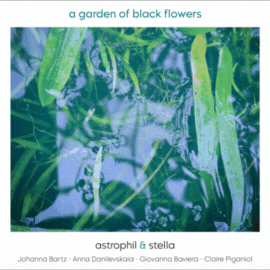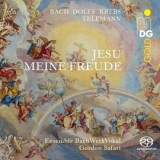 Jesu meine Freude; Kantaten und Motetten von Bach, Doles, Krebs, Telemann; Ensemble BachWerkVokal, Gordon Safari; 1 CD MDG 923 2207-6; Aufnahme 06, 07 & 10/2020; Veröffentlichung 03/2021 (65'35) – Rezension von Jan-Geert Wolff
Jesu meine Freude; Kantaten und Motetten von Bach, Doles, Krebs, Telemann; Ensemble BachWerkVokal, Gordon Safari; 1 CD MDG 923 2207-6; Aufnahme 06, 07 & 10/2020; Veröffentlichung 03/2021 (65'35) – Rezension von Jan-Geert Wolff
Nach dem Debüt-Album Cantate Domino hat das Ensemble BachWerkVokal bei MDG seine zweite Motto-CD veröffentlicht: ‘Jesu meine Freude’ stellt vier Werke gegenüber, denen der gleichnamige berühmte Choral zugrunde liegt. Natürlich ist die Motette von Johann Sebastian Bach zu hören, dann eine weitere von Johann Friedrich Doles, einem von Bachs Nachfolger im Amt des Thomaskantors, sowie Kantaten von Johann Ludwig Krebs und Georg Philipp Telemann. Die Klangkompilation ist klug wie geschmackvoll und erneut exquisit musiziert. Eine feine CD!
Über allem steht natürlich die Bach-Motette, die als drittes Werk erklingt. Dirigent Gordon Safari liefert eine bemerkenswert intensive Interpretation, die Choralstrophen werden transparent begleitet, wobei Orgel, Laute und Cembalo immer wieder apart herausklingen. Beim Choral könnte der Fokus etwas mehr auf dem Textfluss als auf den Fermaten als Zielpunkte liegen, aber wenn es da dann ‘kracht und blitzt’, ergreift einen die Musik fast schon plastisch. Wie von Ferne ertönt a cappella der Chor ‘Denn das Gesetz des Geistes’, bevor der ‘alte Drache’ sein Haupt erhebt, die gläubige Seele jedoch dem Toben der Welt äußerst gelassen gegenübersteht. Wenn BachWerkVokal auf jeder CD eine Bach-Motette derart inspiriert einspielt, darf man sich schon heute auf die nächsten freuen.
Aber höchst lobenswert ist ja eben, dass sich Gordon Safari und das vokal und instrumental exzellent besetzte Ensemble statt eine weitere Gesamteinspielung von BWV 225ff zu liefern umschauen und darüber hinaus spannende wie hörenswerte Musik entdecken. Da ist die elegant und schwungvoll musizierte Kantate von Krebs, in der eine Glockenarie erklingt: Der liebliche Sopran von Zsófia Szabó bildet mit einem leichten Vibrato die Schwingungen ab, der Glockenschlag wird von den Streichern pizzicato auf der 2 und 4 markiert. Die textlich leicht abweichende vierstimmige Motette von Doles ist ebenfalls originell, beispielsweise singt der Bass in der Strophe ‘Donnert auch im Grimm’ den Cantus firmus. Die Diktion ist ohne Fehl und Tadel – ein weiterer lohnenswerter Blick über den musikalischen Tellerrand.
Mit Telemanns Kantate präsentiert BachWerkVokal neben Doles eine zweite Weltersteinspielung. Ein wenig befremdlich ist bei Safaris Interpretation das Verständnis der Choralstrophen: Durch arges Längen verleiht er den doch offensichtlich eher als Bindeglieder zwischen den einzelnen Nummern vorgesehenen Textzeilen ein Gewicht, das sie schlicht nicht haben. Und indem sie derart als eigene Stücke behandelt werden, wird die Kantate parzelliert, ihr immanenter Fluss unterbrochen. Die Textausdeutung im Chor „Wenn ich nur dich habe“ ist zuweilen eigenwillig und die Binnenagogik hier arg überreizt, doch abgesehen davon musiziert BachWerkVokal auch diese Kantate höchst gekonnt. Sehr schön klingt eine weitere Glockenarie (Jakob Hoffmann mit delikatem Bass), in der Telemann den Hörer durch rhythmische Verschiebungen in den Streichern pikant irritiert. In der Sopran-Arie (Electra Lochhead mit geschmackvollem Sopran) sind gleich vier Blockflöten zu hören. Telemann hat über 1.700 Kantaten komponiert – auch hier gibt es also noch unglaublich viel zu entdecken.
After the debut album Cantate Domino, the ensemble BachWerkVokal has released its second motto CD on MDG. ‘Jesu meine Freude’ juxtaposes four works based on the famous chorale of the same name. The motet by Johann Sebastian Bach is heard, of course, then another by Johann Friedrich Doles, one of Bach’s successors as Thomaskantor, as well as cantatas by Johann Ludwig Krebs and Georg Philipp Telemann. The sound compilation is clever as well as tasteful, and once again exquisitely performed. A fine CD!
Above all, of course, stands the Bach motet, which is heard as the third work. Conductor Gordon Safari delivers a remarkably intense interpretation, the chorale verses are transparently accompanied, with organ, lute and harpsichord repeatedly sounding apart. In the chorale, the focus could be a bit more on the flow of the text than on the fermatas, but when it ‘crashes and flashes’ there, the music grips one almost vividly. As if from afar, the chorus ‘Denn das Gesetz des Geistes’ resounds a cappella, before the ‘old dragon’ rears its head, but the believing soul faces the raging of the world extremely calmly. If BachWerkVokal records a Bach motet on each CD in such an inspired way, one can already look forward to the next ones.
But it is highly praiseworthy that Gordon Safari and the excellent vocal and instrumental ensemble, instead of delivering another complete recording of BWV 225ff, look around and discover music that is both exciting and worth listening to. There is Krebs’s cantata, elegantly and sweepingly performed, in which a bell aria is heard: the lovely soprano of Zsófia Szabó reproduces the vibrations with a slight vibrato, the chime is marked pizzicato by the strings on the 2 and 4. The textually slightly different four-part motet by Doles is also original; for example, the bass sings the cantus firmus in the stanza ‘Donnert auch im Grimm’. The diction is without fault – another worthwhile look beyond the musical horizon.
With Telemann’s cantata, BachWerkVokal presents a second world premiere recording alongside Doles. A bit disconcerting in Safari’s interpretation is the understanding of the chorale stanzas: By elongating them, he gives the lines of text, which are nevertheless obviously intended more as links between the individual numbers, a weight that they simply do not have. And by treating them as separate pieces in this way, the cantata is parceled out, its immanent flow interrupted. The interpretation of the text in the chorus ‘Wenn ich nur dich habe’ is at times idiosyncratic, and the internal acoustics here are badly overwrought, but apart from that, BachWerkVokal also performs this cantata most skilfully. Another bell aria (Jakob Hoffmann with delicate bass) sounds very beautiful, in which Telemann piquantly irritates the listener with rhythmic shifts in the strings. The soprano aria (Electra Lochhead with tasteful soprano) features four recorders at once. Telemann composed over 1,700 cantatas – so there is still an incredible amount to discover here as well.

























